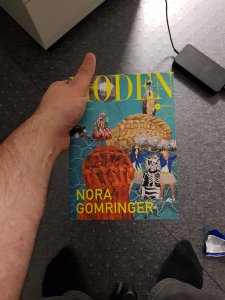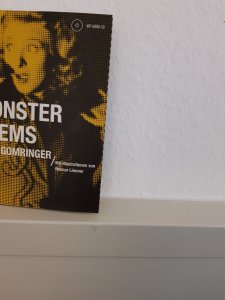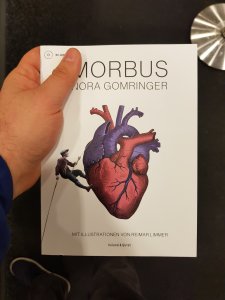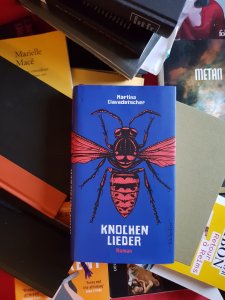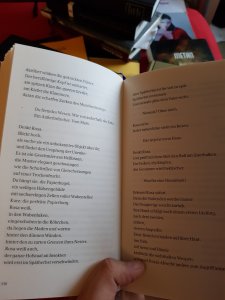If you follow this blog you are likely not fluent enough in German to have followed the Bachmannpreis livestream (see my post about the 2019 event) so here is a brief summary of how day two (of three) went. The writers who read today* were, in this order: Yannic Han Biao Federer, Ronya Othmann, Birgit Birnbacher, Daniel Heitzler, Tom Kummer. You can read all the texts here, if you are so inclined. For day one click here. For a German summary of the whole thing, which I also wrote, for Faustkultur, click here.
There was a strong sense on Tuesday of what the gatekeepers of culture want to be written and published and what they would rather wasn’t. Yesterday had two excellent texts, Sarah Wipauer’s story, which is clearly top of the class this year, and Julia Jost’s. There was one mediocre story by Andrea Gerster, as well as one badly executed, but interesting story by a very talented writer and then, there was a mess of historical revisionism, with a dose of literary cliché. There was no clear sense, as there often is during Bachmannpreis-competitions of texts that fit a mold and texts that don’t. Day two had it in spades.
The first text was written by Yannic Han Biao Federer, a writer with a perfect biography, who has won several literary awards, and has very quickly become part of the cultural gatekeepers himself with his work at the Literaturhaus Köln. Biographically, he appears to be straght from central casting: academical background. work in journalism, work in cultural institutions, awarded some key prizes, and debut novel with one of the leading literary publishers in Germany. No wonder his story, taking almost no risks, offers such a flat take on personal narrative. There are small metafictional twists, slow, detailed observations, and just enough relevance to save the story from utter blandness. It’s not that Federer’s text is bad – it is not. It reads like a chapter from his novel (review likely forthcoming here) – a consistency which points to strong literary control and skill. The blandness is not accidental: Federer’s story is carefully, and skillfully designed to be bland. One is tempted to read the story and the environment its read in in terms of Bourdieu’s theory of practice, in that the (sub-)field of Bachmannpreis is a very specific field. The judges, as well as the audience consists of people of varied background. Academics, successful writers, journalists, people who have or are working as gatekeepers in various cultural institutions. It’s a big field, but also narrow in that they all share a similar sense of references. They have all read this kind of text before. This is like New Yorker poetry, where, dependent on who is editor of the poetry section, the kind of poetry that gets published almost becomes its own genre which you then can see turn up in all kinds of other journals and places. Reading and rereading Federer’s story, it becomes clear that its very specific kind of dullness – it’s a kind of writing that develops when you write a lot of submissions for places, and have to be aware of word count. There is no description that is wrappped in one, two fitting phrases, it’s all extended to the point of maximum ennui. Despite the author’s Asian heritage, which is also mentioned in the story, there’s also a sense of whiteness about the whole thing – or rather: privilege. This was highlighted by two things: the enormous praise by the judges, and by the next story to be read.
Ronya Othmann was on the mound next and immediately hit us right between the eyes with a fastball. A story that couldn’t be more different. Not drowning in descriptions, she used the names of places and people to carry a lot of the descriptive weight, it is a story about how a young yazidic woman who lives in Germany comes to terms with the genocide committed against her people by the IS. Othmann, trained in an MFA, uses this training to make sharp observations about what temporal and geographic distance means. What language means. How do you speak about something that has never been widely or fairly represented in the media of the languages you use to speak or write. The violence against the Yazidis has often been framed in terms of a broader war against the IS – the complicity of the Turkish government, clearly stated by Othmann, never really plays a role in these narratives. What’s more, there is an obsession with particularized, sexualized violence in the media – what does this mean for a young woman, whose family is only alive due to a quirk of personal history. Without being able to migrate (or having a car), her family would have suffered the same fate as all teh murdered and raped people of her ethnicity who stayed behind. Witnessing survival has a long and harrowing literary history, and has perhaps been best described by Primo Levi. There are many survivors of the Shoah who did not really survive – they stayed alive, until they couldn’t any more. People have been writing about this for decades and it is remarkable and laudable that Othmann found new and fresh literary ways to examine this same issue. She discusses quite specifically the question of how to comprehend the fact that she and her family are alive. Are they alive or have they merely survived? Othmann struggles with the binary language between life and death. It is not an accident that one of the best and clearest books on suicide, which attacks the morally freighted binary of life and death has been written by a survivor of the Shoah, Jean Améry. Whereas Federer’s text turned on a metafictional chuckle of bourgeois life in Cologne, Othmann’s text turned on the question of identity. Othmann uses several layers of writing: there is the typing up of recorded conversations, journal entries, and of real actual travels. The story ends with the narrator seemingly shedding the ambiguity of language, coming up right against questions of reality and speech. A remarkable story – not without flaws, but executed with enormous skill. The first sign that Othmann might be in trouble was the Twitter commentary. The twitterati, among them people with some cultural influence, reacted – oddly. There was a worry (yes, worry) that one would be guilted into…what? praise? attention? I feel that if you read a story about genocide and your primary comment is – “Oh no, I’m being morally blackmailed” – I feel I cannot help you. What is this “blackmail” you speak of? Blackmailed into caring? That’s such a remarkably white statement – and it was sort of echoed by the judges. Hildegard Keller felt she couldn’t properly criticise the text’s deficient grammar with a Yazidi survivor sitting right there. I mean, how dare she just turn up and tell a story that is unpleasant. What happened to the long meandering descriptions of mint-colored walls? I mean, the nerve! Other judges decided to re-open the very well trod paths of debates on witnessing and fiction, on truth and literature. There are literally hundreds of thousands of books on the topic. Frankfurt, for example, has a whole frigging professorship dedicated to the topic. What’s the need to re-legislate the topic? I mean literally yesterday, for inexplicable reasons, a judge decided to use Imre Kertesz’s searing work as a comparison for Silvia Tschui’s German nonsense – Imre Kertesz addresses the topic in his work! To be honest, I am not sure it’s plausible NONE of them were aware of this. The longer this discussion went on, the more it seemed like they needed an excuse not to engage with the text. The unwillingness to have a literary discussion about a text, which is written with such excellent literary skill (if anything, one of its flaws is that you can see the MFA training a bit too clearly in it) struck an unpleasant note this fine Friday morning.
The final text this morning combined two things: being palatable to the judges and exquisitely written. A absurdist-but-relatable story about a woman who’s relatively poor, struggles with a life that is less than she and others hoped for. She takes smaller jobs to not preclude the possibility of writing A Novel, but what sounds like depression, family struggles and other issues prevent her from giving her life a shape that she would be satisfied with. It’s a ramshackle, unfinished, unformed life, like many people still lead it today. Suddenly, a cabinet appears mysteriously. Birgit Birnbacher, already one novel under her belt, writes this story with enormous skill – it is much funnier than I made it seem, it is cleverly structured, addressing racial, gender and other concerns, even metaphysical ones, without ever having to strain. It’s not quite as flawless as Wipauer’s tale, but that’s in part because where Wipauer sticks the landing perfectly, Birnbacher stumbles in the last sentence. If this was a poem, every reader would tell her to just strike it and be done with the whole thing. That seems like a minor flaw in a major, excellent story, and it is. Birnbacher joins Wipauer and Othmann among the favorites to win it all. The judges, meanwhile, agreed. Praise was unanimous and detailed. There was no sense of “we have a thirty-something woman in front of us, how can we discuss a story about a thirtysomething woman,” meanwhile. One wonders why.
Birnbacher’s story concluded the morning readings and the good portion of the event. The two afternoon readings – hoo boy. The first, a story by Daniel Heitzler, is hard to talk about. I mean you’ve all heard of Poe’s Law, right (definition here) – this was a perfect literary equivalent. On the surface, this is just a very bad story. A very bad story, structured badly, drowning in adjectives and adverbs, mindlessly run through a thesaurus, like that high school essay we’ve all seen (“Students: Stop. Halt. Discontinue. Terminate. Cut it out with all the thesaurused smart-person words in your essays.”). I remember, on a literary forum that I’m not entirely sure still exists, someone once explained to me that Julian Barnes’ novel The Sense of an Ending wasn’t a cliché-riddled mess, but specifically invoked the clichés involved in talking about death. There was nothing in the text that suggested that, except that forum member’s goodwill. I mean, the books Barnes has published since have disproved that theory, but as an approach, it stuck with me. It’s a literary Poe’s Law: an awful literary text is indistinguishable from a very good parody of an awful literary text, if there’s no wink in the parody. Sometimes the sheer skill involved provides the wink: Robert Coover is probably the best example: his parody and homage to Louis L’Amour-style WEesterns, Ghost Town, or his homage to Noir novels in, uh, Noir, are written with enormous skill. On the “wink” side of things is maybe John Barth’s The Sot-Weed Factor, which is hilarious. Not his best book, but Barth incorporates winks into the style he parodies. There is nothing, nothing of the sort in Daniel Heitzler’s story. The best we get is a comment in the intoductory video that he’s a fan of American postmodern literature, especially Beat and David Foster Wallace. Sure, nothing bad has happened with young devotees to DFW’s work. Sure. You know I was once at a meeting of the DFW society at a conference where they had a roundtable dedicated to salvaging the bad reputation of DFW’s work, created by his acolytes and the unsavory facts that had come out about DFW’s own misogyny. So faced with a young man, essentially subscribed to a problematic literary tradition, the judges decided that the text could not possibly be this bad – it had to have been done on purpose. i have thought long and hard on the fact that all the judges except one insisted on reading the text this way and I think this goes back to the assumption, shaken by Otoo’s nonchalant interview after her win: “we are smart and important people. A writer wouldn’t dare come here with a text this bad. Ergo, it has to be good.” That this judgment appears to be solely a creation of the subfield of Bachmannpreis thinking becomes clear once you look at the unanimous rejection of the text on Twitter.- there wasn’t a torn opinion. Nobody read the text and thought: oh this is intentional. Personally, I have limited patience for intentionally bad writing anyway. If you make me read ten pages of bad prose that you artfully and cleverly shaped to be this friggin bad, I still have to read ten pages of bad prose. There’s a masturbatory quality to this kind of writing, and let me tell you, I have never seen it practiced by female writers. I feel that says something right there.
I don’t know what to say about the final story that I didn’t already suggest even before he read. Read my original TDDL post for notes on who Tom Kummer is. Kummer is a kind of inverted mirror of Federer, the first guy to read today. Kummer is also a production of gatekeepers’ goodwill, but not by following all the rules and pleasing all the right people. He did it by projecting an image of being “the last Gonzo writer” (snort), a literal quote. The bad boy of literature. He turned up, and read a story in a kind of faux-Clint Eastwood drawl that sounded sleazy and unpleasant. His story, about a limousine driver was unpleasant and bad. For someone, who became infamous faking exciting interviews with celebrities, his dialogue was dragging and boring. The story was entirely without ambiguity or tension. Everything was stated plainly and then, for the people in the back, re-stated. The story is unpleasant start to finish, from some lazy racism to literary and explicit misogyny, as well as the weirdest description of a father caressing the naked body of his child i have ever seen. The protagonist’s dead wife re-appears as an octopus-like monster, the only other woman, an accomplished researcher, is, wait for it, an antifeminist who produces a drug to further male sexual enjoyment, because, no kidding, we have too long been interested only in female lust and pleasure – which, I mean, she has never seen any porn or TV or movies, I assume? Or commercials? I mean, what? And for some reason, this turns the protagonist on to the point of considering sexually assaulting his passenger, a thought that he discards after a long struggle. There are no, zero, zilch redeeming qualities in this story, but its invitation shines a light on what’s acceptable and what’s not. Writing a story about genocide gets the judges to equivocate and stay distant. Writing indirectly about rape, on the other hand, raises no red flags. Tom Kummer and Yannic Federer, each in their own way, offer a take on what privilege means in German-language literary culture.
So it’s a day where two of the competitions two best texts so far get sandwiched by an odd duo. At the end of the day, the four best texts are, in this order. Sarah Wipauer, Ronya Othmann, Birgit Birnbacher and Julia Jost.
Below is my list of all my posts about this year’s award:
#tddl: Germany’s Next Literary Idol, 2019 edition.
#tddl, Day One: Holes In Space
#tddl, Day Two: A Privilege Sandwich
#tddl, Day Three: Mollusks and Nazis
*this post is about a week late, let’s pretend it IS “today”


